
The United States presidential election of 1908 was the 31st quadrennial presidential election, held on Tuesday, November 3, 1908. Secretary of War and Republican Party nominee William Howard Taft defeated three-time Democratic nominee William Jennings Bryan.
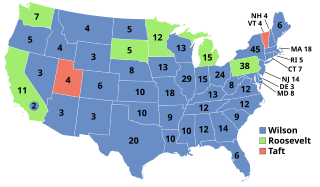
The United States presidential election of 1912 was the 32nd quadrennial presidential election, held on Tuesday, November 5, 1912. Democratic Governor Woodrow Wilson of New Jersey unseated incumbent Republican President William Howard Taft and defeated former President Theodore Roosevelt, who ran as the Progressive Party nominee. Roosevelt remains the only third party presidential candidate in U.S. history to finish better than third in the popular or electoral vote.

The Governor of Massachusetts is the head of the executive branch of the Government of Massachusetts and serves as commander-in-chief of the Commonwealth's military forces. The current governor is Charlie Baker.

The Massachusetts General Court is the state legislature of the Commonwealth of Massachusetts. The name "General Court" is a hold-over from the earliest days of the Massachusetts Bay Colony, when the colonial assembly, in addition to making laws, sat as a judicial court of appeals. Before the adoption of the state constitution in 1780, it was called the Great and General Court, but the official title was shortened by John Adams, author of the state constitution. It is a bicameral body. The upper house is the Massachusetts Senate which is composed of 40 members. The lower body, the Massachusetts House of Representatives, has 160 members. It meets in the Massachusetts State House on Beacon Hill in Boston.

The Province of New Hampshire was a colony of England and later a British province in North America. The name was first given in 1629 to the territory between the Merrimack and Piscataqua rivers on the eastern coast of North America, and was named after the county of Hampshire in southern England by Captain John Mason, its first named proprietor. In 1776 the province established an independent state and government, the State of New Hampshire, and joined with twelve other colonies to form the United States.
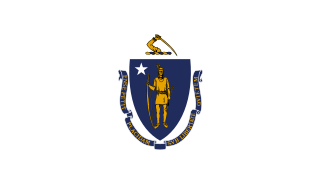
The flag of the Commonwealth of Massachusetts is the flag of Massachusetts. It has been represented by official but limited-purpose flags since 1776, though until 1908 it had no state flag per se to represent its government. A variant of the white flag with blue seal was carried by each of the Massachusetts volunteer regiments during the Civil War alongside the National Colors. An exception were the two "Irish regiments", each of which was permitted to carry an alternative green flag with a harp symbol. The state currently has three official flags: a state flag, a "naval and maritime flag", and a governor's flag. With Florida and Minnesota, it is one of only three state flags to prominently feature a Native American in its heraldry.

John Anthony Volpe was an American diplomat, politician and member of the Republican Party who served as the 61st and 63rd Governor of Massachusetts from 1961 to 1963 and 1965 to 1969, as the United States Secretary of Transportation from 1969 to 1973 and as the United States Ambassador to Italy from 1973 to 1977.
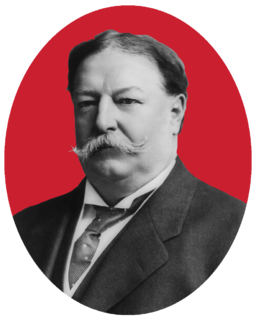
The 1908 Republican National Convention was held in Chicago Coliseum, Chicago, Illinois on June 16 to June 19, 1908. It convened to nominate a successor to the popular GOP President, Theodore Roosevelt and his Vice President, Charles W. Fairbanks.

The Lieutenant Governor of Massachusetts is the first in the line to discharge the powers and duties of the office of governor following the incapacitation of the Governor of Massachusetts. The constitutional honorific title for the office is His, or Her, Honor.

Louis Adams Frothingham was a United States Representative from Massachusetts. He was born in Jamaica Plain on July 13, 1871. He attended the public schools and Adams Academy. He graduated from Harvard University in 1893 and from Harvard Law School in 1896. He was admitted to the bar and commenced practice in Boston. He served as second lieutenant in the United States Marine Corps in the Spanish–American War.

A Massachusetts general election was held on November 7, 2006 in the Commonwealth of Massachusetts.

Curtis Guild Jr. was an American journalist, soldier, diplomat and politician from Massachusetts. He was the 43rd Governor of Massachusetts, serving from 1906 to 1909. Prior to his election as governor, Guild served in the Massachusetts Volunteer Militia, seeing active duty in Cuba during the Spanish–American War. He was publisher of the Boston Commercial Bulletin, a trade publication started by his father.

Channing Harris Cox was an American Republican politician, lawyer, and businessman from Massachusetts. He served as the 49th Governor of Massachusetts, from 1921 to 1925. He attended Dartmouth College and served as lieutenant governor to Calvin Coolidge, winning election as governor after Coolidge decided to run for vice president. Cox was noted for advancing progressive labor legislation and adjusting administrative law to Massachusetts' changing economy. He was also the first Massachusetts governor to use radio, when he broadcast live from the Eastern States Exposition on September 19, 1921, at the debut of station WBZ in Springfield.
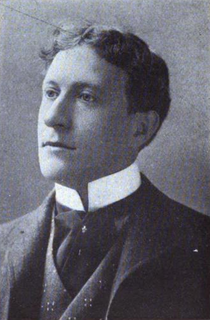
John Austin Keliher was a U.S. Democratic politician.

Joseph Francis O'Connell was a Massachusetts lawyer, law professor, politician and U.S. Representative.

William Croad Lovering was a U.S. Representative from Massachusetts.

The Independence Party, established as the Independence League, was a short-lived minor American political party sponsored by newspaper publisher and United States Representative William Randolph Hearst in 1906. The organization was the successor to the Municipal Ownership League, under whose colors Hearst had run for Mayor of New York in 1905.
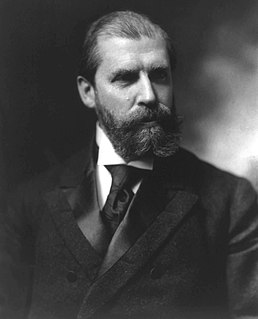
The 1906 New York state election was held on November 6, 1906, to elect the Governor, the Lieutenant Governor, the Secretary of State, the State Comptroller, the Attorney General, the State Treasurer and the State Engineer, as well as all members of the New York State Assembly and the New York State Senate.

The 1912 United States presidential election in Massachusetts took place on November 5, 1912, as part of the 1912 United States presidential election, which was held throughout all contemporary 48 states. Voters chose eighteen representatives, or electors to the Electoral College, who voted for president and vice president.

The 1908 United States presidential election in Massachusetts took place on November 3, 1908 as part of the 1908 United States presidential election. Voters chose 16 representatives, or electors to the Electoral College, who voted for president and vice president.




















